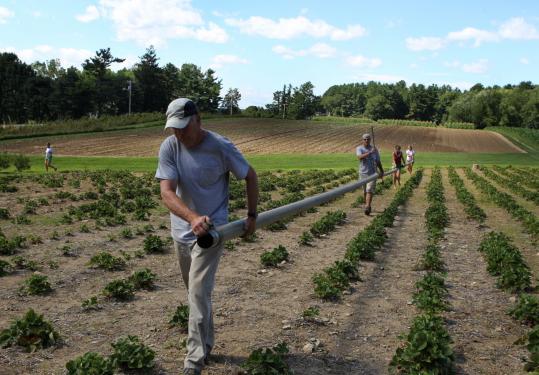
Bob Temple, a full-time Tuttle Farm worker; Lia Norman; Jenn Hall; and Tim Warren installed irrigation piping. (Kayana Szymczak for The Boston Globe)
End of a 378-year era
Nation’s oldest running family farm put on market in N.H.
Bob Temple, a full-time Tuttle Farm worker; Lia Norman; Jenn Hall; and Tim Warren installed irrigation piping. (Kayana Szymczak for The Boston Globe)
DOVER, N.H. — Like generations of Tuttles before him, Will Tuttle has spent his life on the family farm, working its tree-lined acres from seed to harvest. He learned by the side of his father and grandfather and, like them, chose to make his living off the land. But after years of toil and dwindling demand for the crops he
produced, the thick-armed 63-year-old has decided the family legacy will
end with him. His landmark property — passed from father to son since
1632 and billed as the country’s oldest continually operating family
farm — is up for sale.
“Since the economy turned, we’ve been losing,’’ said Michelle
Tuttle, 43.
Founded by English settler John Tuttle, who arrived in the New World with a land grant from King Charles II, the farm grew into an institution.
Local residents looked forward to picking season for months, and
tourists went miles out of their way for a visit. Even actor Robert
De Niro was known to stop in now and again.
Some came for Tuttle’s considerable collection of cheeses, others
for its fruits and gourmet deli.
But Tuttle’s calling card has always been its sweet corn.
“Ask anyone, they’ll tell you, ‘We only get our corn from Tuttle’s,’
’’ Michelle Tuttle said. “People are buying it faster than we can
bring it in from the field.’’
New customers are often surprised when they find that the corn is
warm to the touch, she said. “They don’t realize it’s still hot from
the sun.’’
Sure enough, nearly every customer in the store around lunchtime
yesterday bought at least a couple of ears.
“I plan to have it tonight,’’ said Joan Norton, a 74-year-old from
Dover who visits Tuttle’s weekly.
Even though she did not grow up on the farm, Michelle Tuttle has
grown to love it and cried when her husband told her he thought they
should sell it.
Will Tuttle is decidedly less nostaglic, even when mulling the end
of a family enterprise born more than a century before the country
itself. With the economy and the changing landscape of the
small-farming industry, it was time, he said.
“Fifty-seven years is enough,’’ he said, noting that he was just 6
when he began helping out his grandfather. “And I didn’t want this
to become a burden.’’
The Tuttles own a home next door to the farm and plan to move there
when the sale goes through. After years of backbreaking work, that
view will be perfect, he said. And thanks to the conservation
restriction, the land, a lovely vista of fields and woods, will
remain largely unchanged.
“It’s not going anywhere,’’ he said. “It will always stay beautiful,
open land, and will always be a piece of land with every square inch
of my sweat on it.’’
Still, when Tuttle considers life without the farm, he grows
wistful, if only for a moment.
“You’re going to have to put a chain on me or I’ll pick up a hoe,’’
he quipped to his wife, who seemed open to the idea.
Though they stand to make a tidy sum from the sale, the Tuttles say
they will maintain a modest lifestyle. When pressed, Michelle Tuttle
does mention one dream, to return to Italy, Spain, and Portugal for
the first time since she and Will eloped there 15 years ago.
“We are laid-back farm people,’’ she said, noting that she has no
cellphone or e-mail address. “But going back again would be nice.’’
Peter Schworm can be reached at
schworm@globe.com.
© Copyright 2010 Globe Newspaper Company. To subscribe or
visit go to:
http://www.boston.com
|